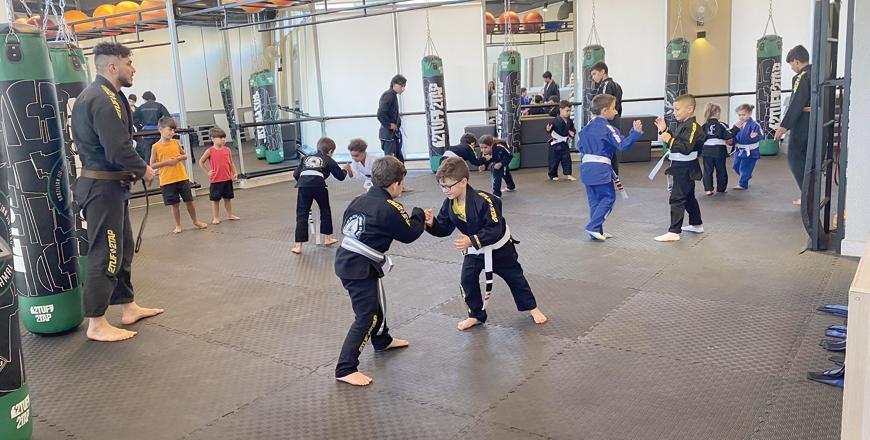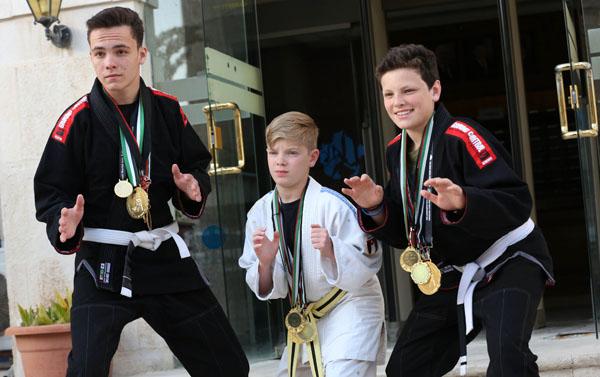You are here
Jordanian jiu-jitsu instructor empowers underprivileged children through martial arts
By Mays Ibrahim Mustafa - Aug 21,2022 - Last updated at Aug 21,2022

Children practise jiu-jitsu under the supervision of instructors trained by Samy Jamal, a six-time jiu-jitsu world champion (Photo by Mays Ibrahim Mustafa)
AMMAN — Jordanian jiu-jitsu black belt Samy Jamal is leading a social project to empower underprivileged children in Jordan through sports.
Jamal, a six-time jiu-jitsu world champion, learned the sport in Brazil and has been practising it for over 30 years. Jamal was also a jiu-jitsu instructor for the Jordanian Gendarmerie for 10 years.
Brazilian jiu-jitsu is a ground-based martial arts sport with roots tracing back to the Japanese Samurai culture in the early 15th century. It focuses on the skill of gaining control over a resisting opponent via techniques known as takedowns, joint locks or chokeholds.
Jamal noted that the “chess scheme” of jiu-jitsu, which is Japanese for “gentle art”, is what distinguishes it from other sports.
“It requires mental speed, as you must process the situation, make a decision and put that decision into action before your opponent overwhelms you,” Jamal told The Jordan Times.
Twelve years ago, Jamal started a project teaching jiu-jitsu to boys and girls at a local association that cares for orphans with one of his students, five-time jujitsu world champion Rana Qubbaj.
“We use jiu-jitsu to build kids’ character by embedding values such as loyalty, willpower, courage, compassion, confidence, persistence, respect, honesty and discipline,” Jamal said.
He also noted that these values ensure that kids don’t misuse their skills.
“Even if they’re bullied or forced to fight, they don’t react right away. They learn to think first and be calm because they have so much confidence,” Jamal said.
He added that jiu-jitsu is not merely a physical activity, but a “lifestyle”.
“It means that you have to study, be organised, maintain a healthy diet, sleep early and arrive on time with clean gear,” he continued.
Moreover, jiu-jitsu provides children with a community and allows them to challenge themselves with long-term goals, according to Jamal.
Earning a black belt in jiu-jitsu requires 10 years of consistent training, he said, noting that “progress requires humbleness and an ability to accept losses and learn from mistakes”.
“My motto is: You have to leave the gym a better person than you were when you came in,” he said.
Jamal also noted that he aims to give everyone access to a sport that is considered “elite” due to its expensive fees.
“We kept losing students because they had to work to help their families, so whenever we feel that a kid has potential, we invest in them and will even help out their family financially so they don’t take them out of the classes,” he continued.
Twenty-five-year-old Naeem Hafez, a Syrian living in Jordan, was a student that Jamal trained for free.
“I was just a 16-year-old kid and I was reaching out for a strong hand to hold on to. Coach Samy gave me his, and it changed my life forever,” he told The Jordan Times.
Due to a medical issue with his arm, he can no longer compete. However, Hafez has found his passion in teaching and giving back to his community. He is currently a volunteer instructor at the orphan’s association and works at three different sports clubs in Amman.
“Some of the kids I teach didn’t even go to school and can’t read or write, but now they have something in their lives to look forward to,” Hafez said.
He added that his relationship with his students and his coach isn’t limited to the training mats, stating, “Jamal is like a father to all of us, and I have 35 students in the association who view me as an older brother and a friend.”
Some of Jamal’s students are following in his footsteps by opening jiu-jitsu schools in their hometowns, and coaching kids at a highly reduced fee of JD10 per month.
Related Articles
Three ambitious brothers with a desire to be the best put their mind and all their effort into participating in the world’s biggest jiu-jitsu championship and ended up landing two gold medals as a result of their determination.
AMMAN — Hamzeh Rasheed recalls almost everything in terms of belts.
AMMAN — Jiu-Jitsu athletes took the lion’s share of recognition at the annual Black Iris Sports Awards at a special ceremony on Monday.Malek

















